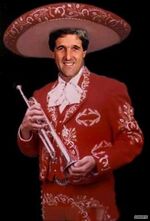Emo Joke
Emo jokes, or jokes relating to emo have a long history in popular culture. With origins dating back to the early twenty-first century, emo jokes are some of the most popular jokes of the contemporary age.
History
Dating back to the early twenty-first century (probably somewhere around 2001, or possibly even 1999), emo jokes, some of the most popular jokes of the contemporary age, can be traced back to Emo Phillips, an unpopular comedian probably from the midwest somewhere. Phillips originally intended them as self-deprecating humor, but shortly after their introduction into his regular standup set, they were misconstrued and used to deride Emo musical groups, their fans, people who wear tight pants, people with dyed hair, people with long hair, and the clinically depressed. Subjects of emo jokes also often include goths, who are not actually emo.
Usage
The emo joke is most commonly used as an insult directed at someone whom the joker considers "emo", but other commonly accepted methods have developed since the joke's popularization. Emo jokes have lost some credibility recently as more and more people have realized that they are not funny. Many of a person's actions or attributes can provoke emo jokes. These include the authoring of poems, having long or longer hair, especially if the hair is straight and ESPECIALLY if the hair covers the "emo's" eyes, being quiet, the wearing of tight pants, reading in public, frowning in public, and the wearing of black shirts, along with a slew of other things.
Variations on the emo joke are almost unnoticeable and equally unfunny. They differ mainly on the subject of direction and form of rhetoric. Some are directed towards ideas or works of art, but mainly the joker does not see the work of art as "art" because they aren't smart enough. Many emo jokes are used in real-life conversations, but some are used in instant messenger or MySpace conversations. These are usually followed by "lol", "lolz", "lolrofl", or a derivative thereof (ex. "tahts emo lol" or "hes emo lolz").
The only tasteful usage of the emo joke, really, is for satirical purposes, either making fun of people who use it seriously, or for the sarcastic trivialization of a work of art (i.e. Emily Dickinson's body of work is emo, lolzorz).
Implications
When one overhears an emo joke being made, it is safe to infer that the maker of the joke is unintelligent, and it is considered appropriate to roll one's eyes or make a jacking off motion with one's hand. When one is directly involved in a conversation in which an emo joke is made, an acceptable response would be a loud, tactless "LOL!!!!" followed by condescending remarks or discontinuation of the conversation in a condescending manner. Either way, a condescending attitude is key. When made the subject of an emo joke, acceptable replies include, but are not limited to, "suck me off, faggot," "derp," "fuck yeah, Hollister, brah," and "you're not real smart, are you, Hoss?" The last of the aforementioned replies calls for a southern accent.
Summary
Emo jokes are tired and cliche. The only people who think they are funny are the people who make them. And the only people who think people who make emo jokes are friendly are other people who make emo jokes (stupid people). But in some cases (most situations) emo kids are not clinically depressed at all, like myself. Emo is nothing more than a trend like hair metal. That is, the sooner it ends the better. Emo kids claim to have no friends in most situations yet 9 out of 10 of them gather in groups or "cliques" of female-resembling, tight clothes-wearing males. Another fact I'd like to point out is the usual hatred for preps, a majority of whom are emo. As for any comments about how all emo jokes are made for and by stupid people, an intellectual bias is shown for previous statements made by the emo person who originally posted a quite unintelligent comment. The conclusion is that emo is nothing more than a fad. You see kids, the moral is not to act depressed when in reality you have virtually nothing to cry about.
